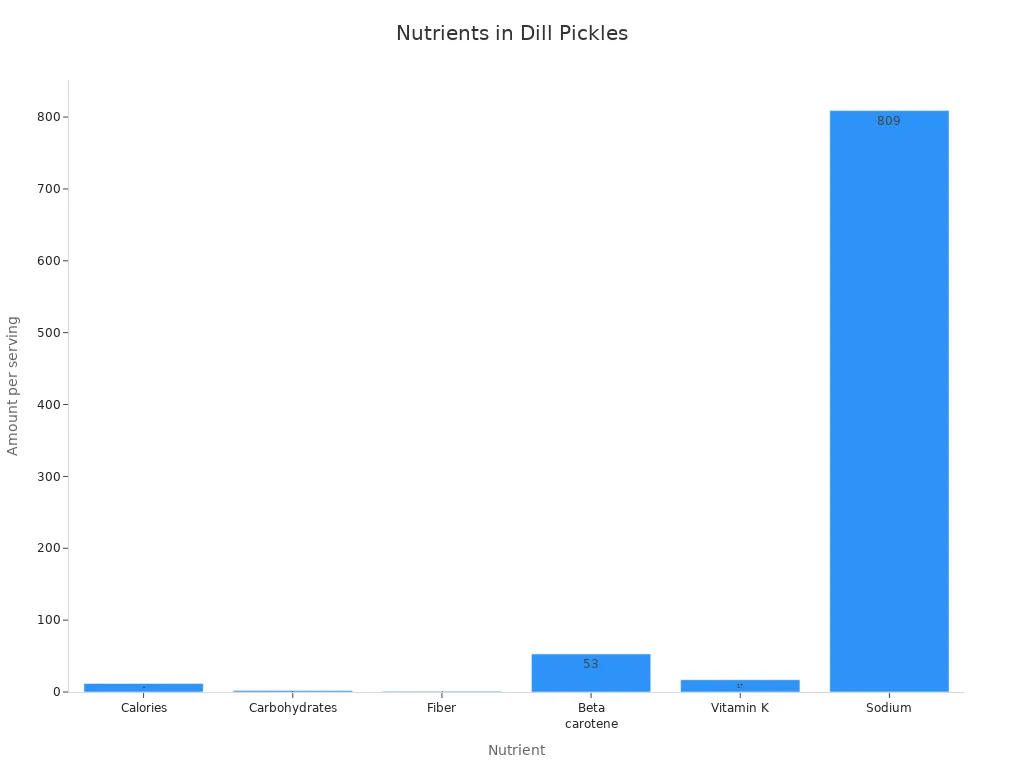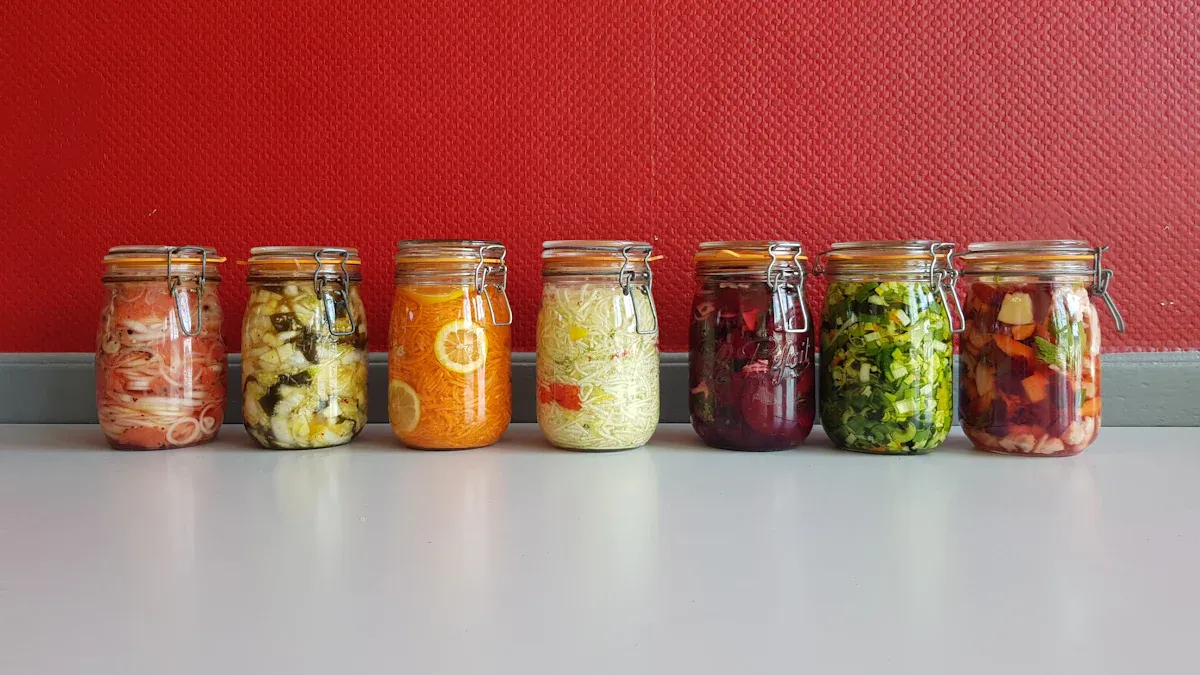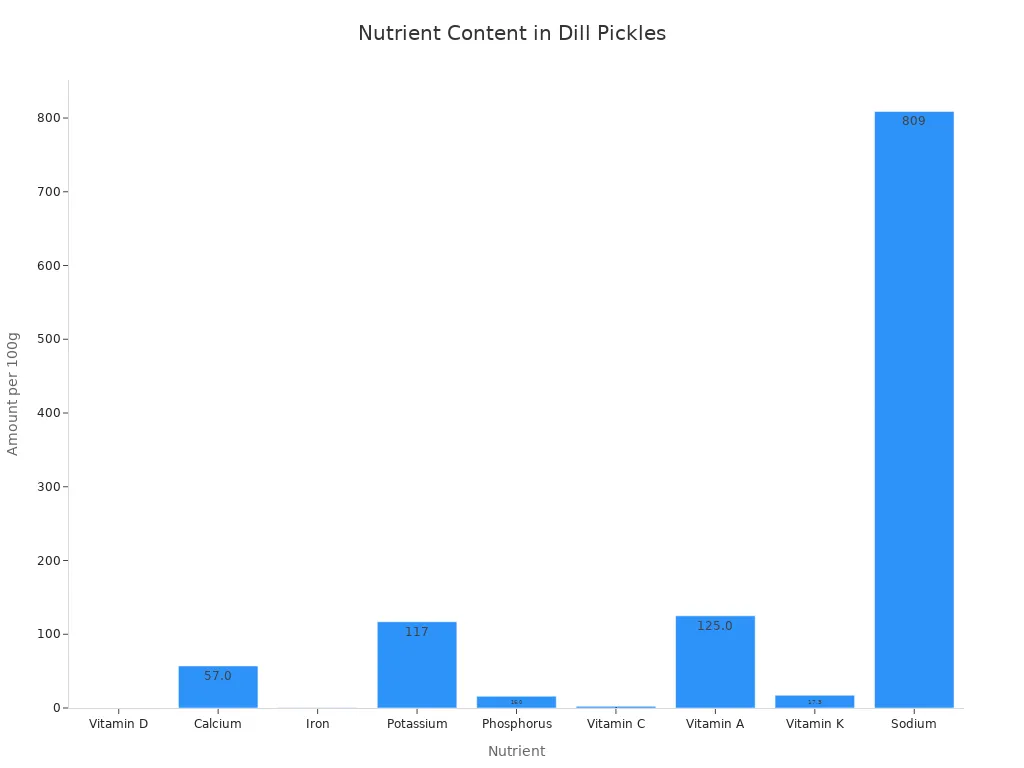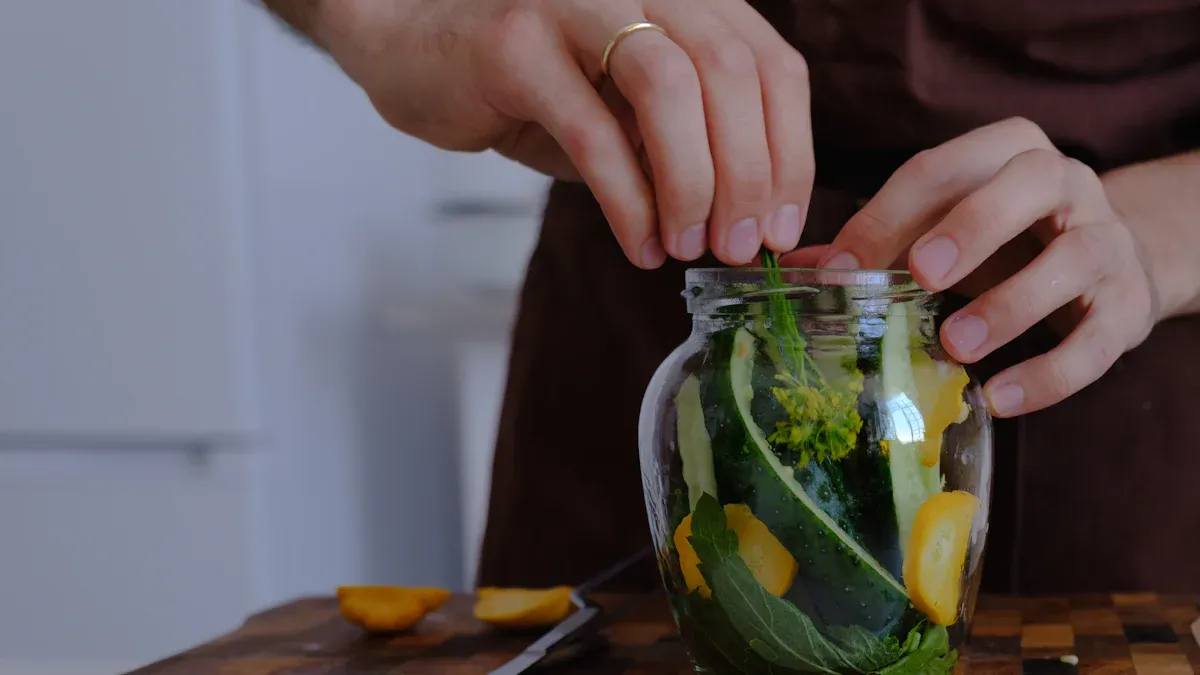- All
- Product Name
- Product Keyword
- Product Model
- Product Summary
- Product Description
- Multi Field Search
Views: 474 Author: Site Editor Publish Time: 2025-04-25 Origin: Site







Dill pickles are a crunchy and tasty snack. They have very few calories and almost no fat. This makes them a good choice for people watching their weight. A normal serving gives you small amounts of vitamins and minerals. These include vitamin K and beta carotene. Some people like that fermented pickles may have probiotics. Probiotics can help your gut stay healthy. You should remember that pickles have a lot of sodium:
One spear has over 300mg of sodium, which is about 13% of the daily limit.
A whole pickle can have 540mg, or 25% of the daily amount.

Eating dill pickles in moderation is best. This helps you get the good parts but not too much salt.
Dill pickles have few calories and little fat. This makes them a good snack if you want to manage your weight. They give you important nutrients like vitamin K, calcium, and potassium. These help your bones and muscles stay healthy. Fermented dill pickles have probiotics. Probiotics help your stomach and make digestion better. You should eat pickles in moderation. Pickles have a lot of sodium. Too much sodium can cause health problems like high blood pressure. Pick low-sodium or homemade pickles for a healthier choice. Eat them as part of a balanced diet.

Image Source: pexels
Dill pickles offer more than just crunch and flavor. They contain a mix of vitamins and minerals that support the body in different ways. People often look at pickles nutrition facts to see what nutrients they get from a serving. Here is a quick look at what 100 grams of dill pickles provide:
| Nutrient | Amount per 100g | % Daily Value |
|---|---|---|
| Calcium | 57 mg | 4% |
| Potassium | 117 mg | 3% |
| Vitamin C | 2.3 mg | 3% |
| Vitamin A | 125 IU | 4% |
| Vitamin K | 17.3 µg | 14% |
| Sodium | 809 mg | 53% |

Vitamin K stands out in dill pickles. It helps blood clot and keeps bones strong. While pickles do not have as much vitamin K as leafy greens like kale, they still give a helpful boost. Calcium and potassium also play important roles. Calcium keeps bones and teeth healthy. Potassium helps nerves and muscles work well. Vitamin C and vitamin A support the immune system and protect cells.
Tip: Dill pickles are low in calories and fat, so they make a light snack for those watching their weight.
Sodium is the main thing people notice in pickles nutrition facts. Dill pickles get their salty taste from the brine used to make them. One spear of dill pickles has about 380 mg of sodium. That is a big chunk of the daily limit, which is 2,300 mg for most adults. Some spears can have as little as 150 mg, while others reach up to 400 mg.
| Pickle Type | Serving Size | Sodium |
|---|---|---|
| Dill Pickles (spear) | 1 spear (35g) | 150-300 mg |
| Kosher Dill | 1 spear (35g) | 200-350 mg |
| Half-Sour/New Pickles | 1 spear (35g) | 100-250 mg |
Note: Eating too many dill pickles can push sodium intake over the healthy limit, especially for people with high blood pressure.
Dill pickles give a lot of flavor and crunch with few calories, but the sodium content means moderation is key. Checking pickles nutrition facts helps people make smart choices for their health.

Image Source: pexels
Pickles are not all the same when it comes to probiotics. Fermented pickles and non-fermented pickles are made in different ways. Fermented pickles use a process called lactic acid fermentation. This lets good bacteria grow in the pickles. The bacteria turn the sugars in cucumbers into lactic acid. Bacteria like Lactobacillus plantarum and Lactobacillus brevis help make probiotics in these pickles.
Non-fermented pickles use vinegar instead of fermentation. Vinegar makes the pickles sour and keeps them from spoiling. The acid in vinegar kills most bacteria, even the good ones. Because of this, non-fermented pickles do not have probiotics.
Here’s a quick look at the difference:
| Type of Pickle | Probiotic Content |
|---|---|
| Fermented Pickles | Rich in probiotics from beneficial bacteria |
| Non-Fermented Pickles | No probiotics due to vinegar’s acidity |
Tip: If you want probiotics from pickles, look for “fermented” or “naturally fermented” on the label.
Fermented pickles do more than add crunch to your food. The probiotics in these pickles help keep your gut healthy. These good bacteria, mostly from the Lactobacillus family, help balance the gut microbiome. They can make it easier to digest food and may help with stomach problems.
Studies show that eating fermented foods like pickles can give you more types of gut bacteria. Having many kinds of gut bacteria is good for your health. Some research found that people who ate fermented pickles had more good bacteria in their gut, even after they stopped eating them. This change can help your body digest food better and may help your immune system.
Probiotics from fermented pickles:
Help break down food in your stomach.
Support the growth of healthy gut bacteria.
May help your body absorb nutrients better.
Dill pickles made by fermentation can be a tasty way to get more probiotics in your diet.
A lot of people ask if pickles are good for you. Dill pickles have some benefits that make them a healthy snack. They have vitamins, minerals, and other nutrients that help your body in different ways. Here are the main health benefits of pickles:
| Health Benefit | Description |
|---|---|
| Antioxidants | Protect cells against free radicals linked to cancer and heart disease. |
| Fiber | Helps digestion and keeps waste moving through the system. |
| Vitamin A | Supports vision and overall cell health as a powerful antioxidant. |
| Vitamin K | Important for heart health, bone strength, and blood clotting. |
| Probiotics | Good bacteria that protect gut health, found in fermented pickles. |
Dill pickles can help you stay hydrated and keep your electrolytes balanced. Pickle juice has more sodium, potassium, and magnesium than many sports drinks. Some athletes drink pickle juice after hard exercise to get back lost electrolytes and help their muscles feel better. Sodium and potassium in pickles help keep your body fluids balanced and help your muscles work.
Many people eat dill pickles because they are low in calories. One spear has only 4 to 10 calories. This means you can eat them without adding many calories to your diet. Pickles are a good snack if you want to lose weight or avoid snacks like chips.
Some research shows that pickle juice might help with muscle cramps. The acetic acid in the juice can cause a reflex in your throat. This reflex helps relax your muscles fast. One study found that drinking a little pickle juice could stop cramps in about 1.5 minutes. This is not because of the electrolytes, but because of how the juice works with your nerves.
Pickles might also help some people with acid reflux. The vinegar and probiotics in fermented pickles can help your stomach and make digestion easier.
Tip: Fermented pickles give you probiotics, which are good for your gut.
Pickles have many health benefits, but there are also some risks. The biggest problem is that pickles have a lot of sodium. Eating too many pickles can cause bloating, make you thirsty, and even raise your blood pressure. Here is a table with some possible health risks:
| Health Risk | Description |
|---|---|
| Digestive Issues | Too much sodium can cause bloating and discomfort. |
| Increased Thirst | High sodium levels may lead to dehydration and make you feel thirsty. |
| Heartburn | Salty foods can make heartburn worse for some people. |
| Nausea | Overeating pickles may cause nausea. |
Doctors say eating a lot of pickles for a long time can raise your blood pressure. This can increase your risk for heart disease, kidney problems, and stroke. Sodium can also make your body keep extra water. This can make your hands, feet, or face swell.
Some people may have stomach problems if they eat too many pickles at once. Experts say you should eat pickles in moderation to avoid these issues. Eating a few spears as part of a healthy diet is safe for most people. But eating pickles with every meal could cause problems over time.
Note: If you have high blood pressure or need to watch your sodium, talk to your doctor before eating more pickles.
Dill pickles are tasty, but how often should you eat them? Most people can have 1 or 2 servings each day if they do not need to eat less sodium. Eating more than this can make your sodium too high, especially if you eat other salty foods. The table below shows what health groups say about daily sodium:
| Organization | Sodium Recommendation |
|---|---|
| USDA | 2.3 grams per day |
| American Heart Association | 1.5 grams per day |
| Average American Consumption | 3.4 grams per day |
If you eat 2 or 3 servings of pickles a day, pick low-sodium kinds and drink lots of water. Foods like bananas and leafy greens can help balance sodium with potassium. It is important to check how much sodium you eat from all foods.
Some people need to be extra careful. These are:
Anyone with kidney problems
People who need to eat less salt for health reasons
Tip: If you have a health problem, talk to your doctor before eating pickles every day.
Dill pickles can be part of many meals. The healthiest pickles are naturally fermented and have live cultures. Look for short ingredient lists with just cucumbers, salt, water, and spices. Homemade pickles let you control what goes in and avoid extra sugar or preservatives.
Here are some smart ways to eat dill pickles:
Eat them raw for a crunchy, low-calorie snack
Add slices to sandwiches or salads for more flavor
Serve as a side with grilled meats or roasted veggies
Use as a topping instead of high-calorie sauces
Pick low-sodium pickles to keep salt lower. Eating pickles with low-sodium meals helps balance things. Keep your portions small, especially if you watch your sodium. Sodium is needed by the body, but eating too much is not healthy.
Dill pickles are crunchy and taste good. They have few calories and some good nutrients. You get vitamin K and antioxidants from them. Fermented pickles also have probiotics. Here is what you get from 100 grams:
| Nutrient | Amount per 100g |
|---|---|
| Calories | 12 |
| Sodium | 809 mg |
| Vitamin K | Present |
| Antioxidants | Present |
| Probiotics | In fermented |
Pickles can help you manage your weight. They might also help your gut stay healthy. But pickles have a lot of sodium. So, you should not eat too many. Experts say these tips can help:
Eat pickles with nuts or cheese to feel full
Pick salty pickles instead of sweet ones
Look for pickles with less sodium on the label
Eating a few pickles sometimes is fine in a healthy diet.
Dill pickles have very few calories. They can help people feel full without adding much to their daily calorie count. Many people use them as a crunchy snack when trying to lose weight.
Most dill pickles do not have added sugar. Some brands add a small amount for flavor. Always check the label if sugar is a concern. Sweet pickles usually contain more sugar than dill pickles.
People with high blood pressure should limit dill pickles. The sodium in pickles can raise blood pressure. Doctors often suggest choosing low-sodium pickles or eating them less often.
Homemade pickles can be healthier. People control the salt and ingredients. Many store-bought pickles have more sodium and preservatives. Homemade pickles often use simple, fresh ingredients.
Some athletes drink pickle juice to help with muscle cramps. The sodium and vinegar may help muscles relax. Research shows pickle juice can stop cramps quickly for some people.